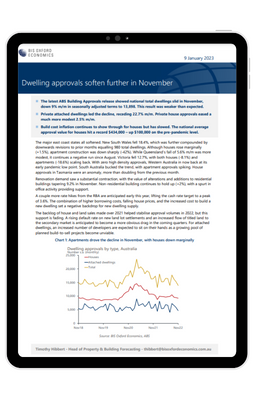Australia: Black Friday boost to retail obscures underlying momentum

Black Friday sales are becoming a larger part of the retail landscape. In recent years, consumers are increasingly delaying purchases that would previously have been made in October and bringing forward December spending to capitalise on lower prices. Seasonal adjustment processes typically control for predictable surges and contractions in activity (i.e. for Christmas and end-of-financial-year sales or store closures over Easter).
What you will learn:
- Retail spending increased by a sharp 1.4% m/m in November 2022, boosted by Black Friday sales. Sales were strongest in non-food categories where Black Friday discounting is more prevalent; clothing sales led growth in the month, followed by spending at department stores. In contrast, spending on food and at cafes & restaurants was little changed in the month.
- Black Friday sales have changed retail spending patterns markedly in recent years. This makes the November data a noisy gauge of consumer spending momentum – we will get a much clearer picture of how households are faring against the prevailing headwinds with the December print.
Tags:
More Australian Research

Post
The socio-economic impact of TikTok in Australia
This report provides the results of our economic modelling of TikTok’s economic contribution to the Australian economy, as well as the findings of survey research into TikTok’s users and Australian businesses. It looks at the real world impacts users report as well as the diversity of TikTok’s online communities.
Find Out More
Post
Australian office sustainability outcomes underpin asset performance
The focus on green office buildings and sustainability is being driven by both government targets to achieve net zero and increasing corporate and investor focus on environmental, social, and corporate governance (ESG) considerations and compliance.
Find Out More
Post
Indian and Australian cities to outpace rivals over 2024-28
We forecast Indian cities to outpace the rest of APAC in terms of GDP growth over the medium term (2024-28). Southeast Asian cities such as Ho Chi Minh City and Jakarta will come close to matching Indian cities and will outperform Chinese ones. Among advanced APAC cities, we expect that Australian ones will fill the top two positions in terms of medium-run GDP growth.
Find Out More